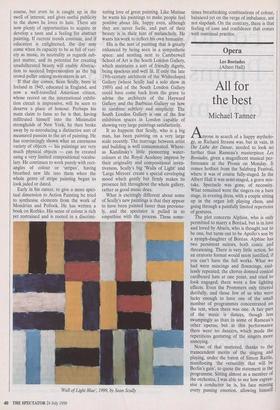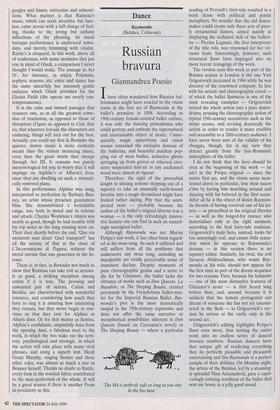Opera
Les Bareades (Albert Hall)
All for the best
Michael Tanner
Aiyone in search of a happy mytholo- gy, as Richard Strauss was, but in vain, in Die Liebe der Danae, needed to look no further than Rameau's masterpiece Les Boreades, given a magnificent musical per- formance at the Proms on Monday. It comes hotfoot from the Salzburg Festival, where it was of course fully-staged. In the Albert Hall it was semi-staged, a grave mis- take. Spectacle was gone, of necessity. What remained were the singers on a bare stage, in evening dress, with a couple sitting up in the organ loft playing chess, and going through a painfully limited repertoire of gestures.
The plot concerns Alphise, who is only permitted to marry a Boread, but is in love and loved by Abaris, who is thought not to be one, but turns out to be Apollo's son by a nymph-daughter of Boreas. Alphise has two persistent suitors, both comic and threatening. There is very little action. So an oratorio format would seem justified, if you can't have the full works. What we had were mincings and flouncings, end- lessly repeated; the chorus donned conical cardboard hats at one point, and tried to look engaged; there were a few lighting effects. Even the Prommers only tittered dutifully, and those few of us who were lucky enough to have one of the small number of programmes concentrated on the text, when there was one. A fair part of the music is dances, though less swampingly so than in some of Rameau's other operas; but at this performance there were no dancers, which made the repetitious gesturing of the singers more annoying.
None of that mattered, thanks to the transcendent merits of the singing and playing, under the baton of Simon Rattle, manifesting 'the versatility that will be Berlin's gain', to quote the statement in the programme. Sitting almost as a member of the orchestra, I was able to see how expres- sive a conductor he is, his face miming every passing emotion, allowing himself gurgles and hisses, entreaties and admoni- tions. What matters is that Rameau's music, which can seem inventive but face- less, came across with a full charge of feel- ing, thanks to the loving but unfussy inflections of the phrasing. So much baroque performance is unphrased nowa- days, and merely brimming with vitality. Rattle's is eloquent, in this work, above all of tenderness, with some moments that put you in mind of Gluck, a comparison I never thought I would make. The passage in Act IV, for instance, in which Polymnie, zephyrs, seasons, etc. enter and dance has the same unearthly but intensely gentle radiance which Gluck provided for the Elysian Fields (the operas are nearly con- temporaneous).
It is the calm and inward passages that reassure one, as in all the greatest come- dies of resolution, as opposed to those of disruption (Figaro as opposed to Cosi, that is), that whatever travails the characters are enduring, things will turn out for the best. Actually, you could say that in Boreades the quieter, slower music is more evidently meant than the violent menacing music, even than the great storm that sweeps through Act III. It remains too purely meteorological for you to worry that it will impinge on Alphise's or Albaris's lives, since they are dwelling on such a romanti- cally removed plane.
In this performance Alphise was sung, interpreted to perfection by Barbara Bon- ney, an artist whose presence guarantees bliss. She demonstrated a formidable range, too, both in mood and in volume and attack. Charles Workman's Abaris was nearly as good, though he had trouble with his top notes as the long evening wore on. Their duet shortly before the end, `Que ces moments sont doux! Quel transport!' has all the ecstasy of that at the close of L'Incoronazione di Poppea, without the moral unease that one generates in the lis- tener.
There is, in fact, in Boreades not much to show that Rameau can take evil as serious- ly as good, a striking exception among artists if it is true. The pressing and unwanted pair of suitors, Calisis and Borilee, are characterised with wonderful resource, and considering how much they have to sing it is amazing how interesting they remain, but they never begin to con- vince us that they care for Alphise as Abaris does. Or for that matter as Semire, Alphise's confidante, exquisitely does from the opening duet, a fabulous start to the work, in which the two stake out the terri- tory, psychological and strategic, in which the action will take place with many vivid phrases, and using a superb text. Heidi Grant Murphy, singing Semire and three other roles, was almost as much a star as Bonney herself. Thanks no doubt to Rattle, every item in the musical fabric contributed to the near-perfection of the whole. It will be a great season if there is another Prom as revelatory as this.



























































 Previous page
Previous page